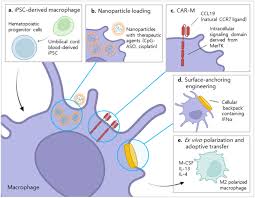Macrophages : New Study

In a new paper published recently, a team of scientists describes the complex interplay between diseased liver cells and macrophages.
- Macrophages are a type of white blood cellthat plays an important role in the human immune system.
- They carry out various functions, including engulfing and digesting microorganisms, clearing out debris and dead cells, and stimulating other cells involved in immune function.
- The term macrophage is formed by the combination of the Greek terms “makro” meaning big, and “phagein” meaning eat.
- Macrophages form from monocytes, which themselves derive from the bone marrow
- Monocytes circulate through the blood for one to three days before migrating into tissues, where they become macrophages or dendritic cells(i.e., a type of antigen presenting cell that plays a role in linking the innate and adaptive immunity).
- Macrophages can be found within many organs in the body, including the liver, brain, bones, and lungs, as well as in the blood, particularly at sites of infection.
- They are essential for the maintenance and defence of host tissues, doing so by sensing and engulfing particulate matterand, when necessary, initiating a pro-inflammatory response.
- They can modify themselves to form different structuresin order to fight various different microbes and invaders.
- In this way, macrophages provide the first line of defense in protecting the host from infection.
- They are also involved in the development of non-specific or innate immunity.
- This type of immunity is a long-term immunity which is acquired when a macrophage ingests a microbe and presents the microbe’s antigen on its surface to alert other white blood cells to the presence of the invading particle.
- Other white blood cells then multiply and amount an immune response against the pathogen.
- Macrophages produce a variety of cytokines, which are signaling molecules that communicate with other cells of the immune system.




